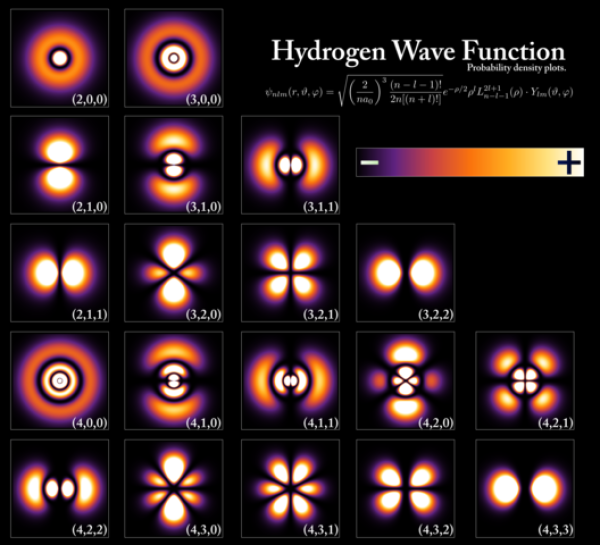BY LETTER
Quantum Mechanics
Quantum mechanics is a foundational field of physics which describes the behavior of matter and energy at the subatomic scale.
The principles of quantum mechanics first began to be discovered by Terragens during the late Industrial Age on Earth (c. 50 BT), when a series of discoveries by baseline human physicists revealed that fundamental particles such as electrons and photons did not fully obey the rules of classical mechanics as described by Newton, Maxwell and other early physicists. One of the key findings during this period was that quantum systems (e.g. particles, atoms and molecules) do not always behave as localized objects, but under certain conditions appear to exist as a diffuse wave-like "superposition" of all possible states known as a wavefunction, which "collapses" to a single state in a probabilistic manner upon interacting with a classical system, such as a measurement device being operated by a sophont observer. This and other unexpected findings led to a "quantum revolution" which lasted well into the first century AT, greatly expanding Terragen scientific understanding of the fundamental nature of reality and laying the foundation for numerous technological advances which underlie many of the most ubiquitous technologies found in the Modern Era. Some common examples of devices which utilize quantum principles include lasers, electron microscopes, solar energy-collection cells, quantum computers, programmable quantum-dot arrays (PQDAs), and various forms of transapient-derived technology such as transfer planes, quantum impellers, and Q-mirrors. It has also been hypothesized that several of the most powerful and inexplicable technologies used by the Greater Archailects owe their seemingly-miraculous properties (at least in part) to a more complete understanding of quantum mechanics and its applications than has yet been achieved - or can ever be achieved - by modosophont science.
(Note: for a more complete discussion of the history, principles, and applications of quantum mechanics, please access the Encyclopaedia Galactica's Educational Module on Quantum Mechanics.)
The principles of quantum mechanics first began to be discovered by Terragens during the late Industrial Age on Earth (c. 50 BT), when a series of discoveries by baseline human physicists revealed that fundamental particles such as electrons and photons did not fully obey the rules of classical mechanics as described by Newton, Maxwell and other early physicists. One of the key findings during this period was that quantum systems (e.g. particles, atoms and molecules) do not always behave as localized objects, but under certain conditions appear to exist as a diffuse wave-like "superposition" of all possible states known as a wavefunction, which "collapses" to a single state in a probabilistic manner upon interacting with a classical system, such as a measurement device being operated by a sophont observer. This and other unexpected findings led to a "quantum revolution" which lasted well into the first century AT, greatly expanding Terragen scientific understanding of the fundamental nature of reality and laying the foundation for numerous technological advances which underlie many of the most ubiquitous technologies found in the Modern Era. Some common examples of devices which utilize quantum principles include lasers, electron microscopes, solar energy-collection cells, quantum computers, programmable quantum-dot arrays (PQDAs), and various forms of transapient-derived technology such as transfer planes, quantum impellers, and Q-mirrors. It has also been hypothesized that several of the most powerful and inexplicable technologies used by the Greater Archailects owe their seemingly-miraculous properties (at least in part) to a more complete understanding of quantum mechanics and its applications than has yet been achieved - or can ever be achieved - by modosophont science.
(Note: for a more complete discussion of the history, principles, and applications of quantum mechanics, please access the Encyclopaedia Galactica's Educational Module on Quantum Mechanics.)
Related Articles
- Multiversalism
- Quantum - Text by M. Alan Kazlev
Term coined by Old Earth late Industrial Age scientist Max Planck to describe an individual particle of light. At the subatomic level, matter and energy occupies discrete packages, or quanta. These govern all particle interactions and physical qualities, including electric charge, spin, and so on. - Quantum Channel
- Quantum Cryptography - Text by Anders Sandberg in his Transhuman Terminology
A system based on quantum-mechanical principles. Eavesdroppers alter the quantum state of the system and so are detected. - Quantum Decoherence - Text by M. Alan Kazlev
A process in which the ambiguous quantum state of a particle, such as the nuclear spin of an electron representing a qubit in a quantum computer, is resolved into an unambiguous state, whether measured or not (conscious observers are not needed). - Quantum Entanglement
- Quantum Entanglement Device, QED - Text by M. Alan Kazlev with note by Anders Sandberg
Mythological godtech or clarketech communications device that supposedly employs quantum entanglement for limited "ftl" communicate at interstellar distances. Said to be in the hands of powers and archailects. It is commonly believed or supposed in cheap virchfiction that a few have over the centuries fallen into the hands of modosophonts, who have however been able to use them to their useful potential. The reality is that no QED has ever existed; as with FTL it is a myth that is believed by the gullible. It has been known ever since the Atomic and Information ages of Old Earth that actual quantum entanglement cannot be used to send useful information. - Quantum Impeller
- Quantum Levitation
- Quantum nanotechnology
- Quantum-random trigger
Appears in Topics
Development Notes
Text by Andrew P.
Updated 20 January 2025, from an original by M. Alan Kazlev
Initially published on 22 December 2001.
Updated 20 January 2025, from an original by M. Alan Kazlev
Initially published on 22 December 2001.
Additional Information
Image by PoorLeno from English Wikipedia (Public Domain image)
copyright page here
copyright page here







